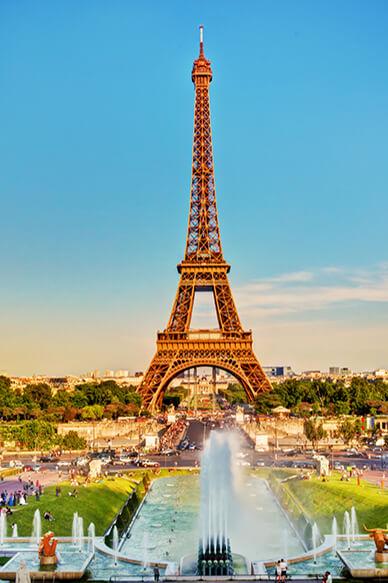Paris is surrounded by two ring roads that greatly facilitate entry to and exit from the city center. Traffic on the inner ring road, known as the "périphérique intérieur," moves clockwise and serves those entering the city. Meanwhile, traffic on the outer ring road, known as the "périphérique extérieur," moves counterclockwise and serves those exiting the city.
Another circular route includes the A186, A86, and A286 roads, located about 10 kilometers outside the city center. These ring roads are wider and more convenient, but it's important to note that they are not considered highways, and the speed limit on them is restricted to 80 km/h.
For those renting a car to travel to or from Paris, there is a network of fast roads that connect the city with various parts of the country. The A1 and A3 roads lead north, the A5 and A6 head south, the A4 goes east, and the A10 goes west.
◾ Parking in Paris
Similar to other metropolitan areas in Europe, Paris experiences heavy traffic during most hours of the day. Many streets are narrow and not well-suited for heavy traffic or parking. Therefore, if you are renting a car outside of Paris, it is highly recommended to park at one of the parking lots at major suburban train stations and then enter the city from there.
There are numerous underground parking lots scattered throughout the city, providing an efficient and cost-effective solution for those with rental cars. Parking lots have an additional advantage: they eliminate the need to understand street parking regulations. It's advisable to check the locations of these parking lots in advance, as they are marked with a white "P" on a blue background.
Street parking is allowed through parking meters during weekdays and is free during the nighttime and weekends. Parking is easier and often free during holidays or the month of August (vacation season). Note that the city is divided into three parking zones, each with its own hourly rate. You can pay at the parking meter or purchase a parking card called Paris Carte at a store and display it visibly in your car.
◾ Car Rental Stations in Paris
Paris has two international airports: Charles de Gaulle Airport (25 km northeast of the city) and Orly Airport (13 km south of the city). Both airports are well-connected to the RER and SNCF train networks, providing easy access to the metro. There are 300 metro stations that make transportation around Paris convenient, comfortable, and cost-effective, especially for tourists. Car rental stations are located at major train stations such as Gare du Nord, Gare Montparnasse, Gare de l'Est, Gare de Lyon, Gare d'Austerlitz, and Gare Saint-Lazare, as well as near many central tourist sites, making it easy to find a nearby rental station regardless of where you are staying in the city.
if you are traveling with your family to Disneyland, you can rent a car for your journey to ensure a comfortable and timely arrival at the famous amusement park and a convenient return to your hotel.
◾ Map of car rental stations in Paris
To make the booking process as convenient for you as possible, we have prepared a map showing the Paris car rental stations of the companies we cooperate with.
מפה רספונסיבית מורחבת
◾ Parking Regulations in France
In many cities in France, you will find "blue zones" (zone bleue) that allow free parking for those with special permits (disque de contrôle/stationnement), which can be obtained from travel agencies, stores, and kiosks. Free parking is usually allowed between 09:00-12:00 and then from 14:00 to 19:00 on weekdays. If you don't have the permit, you must use parking meters (horodateurs). During weekends and in August (vacation season), parking is often free almost everywhere.
◾ "Free Flow" Highways in France
As with Highway 6 in Israel, France operates a toll road system without toll booths called Free Flow, which includes the A13, A4, A79 and A14 highways. Payment for tolls on these roads can be made in one of the following ways:
Online payment:
Highway A79: online payment through Aliae.
Highways A13/A14/A4: online payment through Sanef.
Payment at points of sale: You can pay in cash or by credit card at authorized Nirio points of purchase (a physical payment service for traveling on toll roads).
Make sure to pay within 72 hours after driving on one of these roads to avoid a fine.
◾ Breathalyzer Requirement
French law mandates the presence of a breathalyzer in your car. A breathalyzer, known as Ethylotest in French, is a device used to measure blood alcohol levels. Make sure to inquire about this device at the rental station when picking up your car.
◾ Crossing Borders with a Rental Car
From Paris, you can travel to neighboring countries with a rental car. Ensure that you specify the countries you plan to visit during the reservation process (or inform the rental agent if booking over the phone) to receive written confirmation from the provider, ensuring insurance coverage and road assistance in those countries. Keep in mind that some countries, such as Switzerland, require the purchase of highway stickers for driving on highways. You are responsible for obtaining these stickers, which can be purchased at the border or at fuel stations and service areas along the highways.

 Tips for Winter Driving in Paris
Tips for Winter Driving in Paris
◾ Winter Equipment Regulations in France
In 48 designated regions in France, strict regulations apply between November 1 and March 31 of the following year, requiring drivers to carry winter equipment.
For your convenience, we have prepared a map showing the areas where winter tires are mandatory (click here to view the map).
It is your responsibility to check whether your planned route passes through these areas and, if so, to equip yourself with the appropriate gear - namely, winter / all-season tires, 3PMSF-certified tires, and/or snow chains, depending on road conditions.
Please note that rental companies provide snow chains only at selected locations and do not offer them when booking several specific car groups.
You are responsible for ensuring that you have the required equipment for your planned route, especially when traveling to mountainous or snowy areas.
If you expect to drive in snow, you should carry snow chains as a backup and install them when required, as indicated by road signs. If necessary, snow chains must be purchased independently at your destination.
Also, if you plan to travel outside France with the rental vehicle, please check the regulations in your destination country, indicate it in your booking, and choose a vehicle category equipped with suitable tires.
Failure to comply with these regulations and driving without the required equipment may result in a fine, and insurance coverage will be invalid if the rental vehicle is damaged.
◾ Snow Chains
Snow chains are mandatory in snowy areas. You need to install them in accordance with road signs and order them in advance from the rental company. The use of snow chains is subject to road conditions and requires driving at lower speeds.
◾ Driving a diesel/electric vehicle during winter time
Please note, that in very low temperatures, diesel fuel may freeze, so it's important to prepare accordingly when you are in driving in especially cold conditions. It is recommended to park the vehicle in a covered parking lot and purchase anti-freeze liquid to prevent the freezing of the fuel. Also note that electric cars are also affected by the cold, and it is possible to experience a drop of up to 30% in the range of use of the battery.
◾ Ski Rack
Some rental companies offer ski racks for attaching to your rental car. These should be ordered in advance and are suitable for two pairs of skis. They come at an additional cost, so inquire about availability and book accordingly.
Lastly, in extremely cold temperatures, fuel in the tank may freeze. It's advisable to park the car in a sheltered parking lot and/or add antifreeze to the fuel tank during refueling (a special substance that prevents freezing), which can be purchased at fuel stations if needed.
Ofran wishes you a safe and enjoyable trip with your rental car in Paris!




